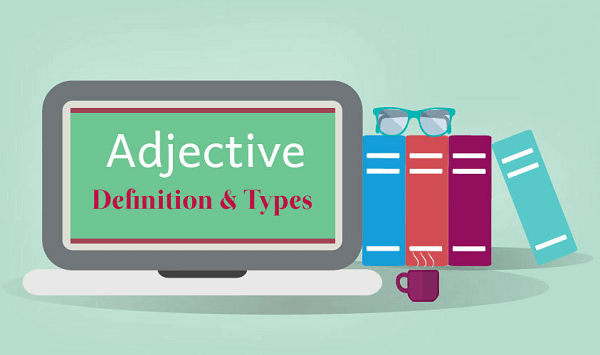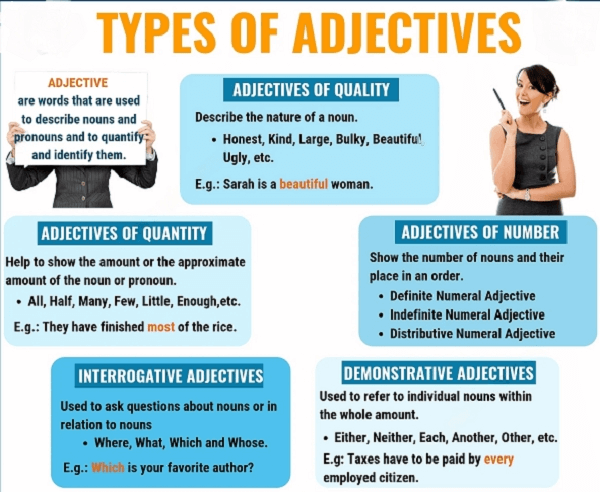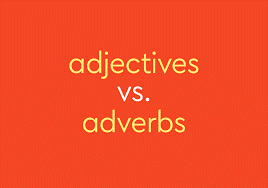Adjective Definition
Adjectives are terms that characterize the characteristics or emotional states of objects, such as big, goofy, bright, enjoyable, or quick. They can also be used to indicate the number of words there are like many, few, millions, and eleven. A term that characterizes a name or phrase is what the Cambridge Dictionary defines as an adjective. A more comprehensive explanation can be found in the Collins Dictionary. It states that an adjective is a term, for example, "big," "dead," or "financial," that defines someone or something or provides further details regarding them. Normally, adjectives appear before words or after linking verbs. An adjective is described as "a word that depicts a person or item, for example, "large," "red," and "intelligent" in a big home, red wine, and a clever plan" in the Oxford Learner's Dictionary. According to the Merriam-Webster Dictionary, an adjective is "a text relating to one of the significant form lessons in any of multiple languages and usually assisting as an alteration of a noun to symbolize the standard of the item designated, to demonstrate its quantity or size, or to outline a thing as unique compared to something else" Let's find out the details of words, including their kinds, definitions, and meanings. Examine the samples to see how they function in phrases. What are Adjectives?Adjectives are an important component of speech that not only add intrigue to words but also convey quite a bit more detail when used in both writing and speech. It simply seems reasonable that we discover more about them and how to apply them effectively in our statements, given all of the beneficial work they execute. Let's examine a couple of examples to see how adjectives function. Adjectives are absent from the first statement and are present in the second.
These two statements are both acceptable. The second phrase, however, provides more details than the first. The second line informs us that Sonam's shoes have never been worn before and that the shop she visited was busy. What Phrase Patterns Do Adjevtives Follow?An Adjevtive can be predication (appearing after the noun) or attribution (occurring before the noun). A linkage verb, which could be a form of the verb "to be," usually comes after a declarative adjective in order to connect the adjective to the sentence's subject. Several instances of predicative and attribution words
Some adjectives are limited to use in one place, while most adjectives can appear in either the attributive or predicative positions. Words like "main" and "asleep," for instance, can only be applied in their proper attributive or predicative positions
The reason is main...
The asleep man is ... Adjective UsageAn adjective can either come after the word it describes(postpositive)or before it(Prepositive) depending on the sentence structure. An adjective's pre- or post-position can be affected by structural, environmental, and stylistic factors in specific cases of its appearance. Adjective usage in English can typically be divided into one of the following three distinct groups: 
1. Prepositive AdjectivesPrepositive adjectives also referred to as "attributive adjectives," appear in a word sentence on the premise of the predecessor. As an illustration, consider the sentence "I placed my happy children in the car," where the word happy is a precursor of the noun expression "my happy children" and thus serves as a prepositive adjective. 2. Postpositive AdjectivesPostpositive adjectives can take place:
3. Nominalised AdjectivesAdjectives that have been given a word form. One method to achieve this is to remove a noun from an adjective-noun word sentence; the resulting nominalization is the result. In the phrase, "I read two novels to them; he selected the sad book, but she selected the happy,? happy is a nominalized word, short for "happy one" or "happy novel". A further example of this is when people say things like "out with the old, in with the new," where "the old" refers to "that which is old" or "all that is old," along with "the new," which uses an identical phraseology. The word could serve as a collective name in these situations, as in the preceding example. The phrase "The meek will rule over the earth" uses the multiple-list word "the meek," which refers to "those who are meek" or "all who are meek" in the English language. The Degree of AdjectivesDid you understand that words can be applied to contrast comparable characteristics between various objects that carry out exactly the same deed? Adjectives come in three varieties, or more precisely, three gradations of contrast. These are
1. Absolute or Positive formWhen referring to a single individual or object, the phrase "positive degree" is implemented. A positive degree refers to a word or phrase that does not draw an opposite conclusion. It is only used to describe a characteristic of a specific word or adjective that serves as the sentence's topic. Positive degree of comparison instances are:
Insights for Using the Positive Degree of Comparison When utilizing a favorable degree of comparison, it's important to keep in mind that it takes the shape of an adjective or phrase. For instance, the book is bad."
A way to use the affirmative degree in another way.
A negative statement can also be indicated using the same structure.
2. Comparative FormAs the name implies, the comparative degree can be utilized to assess the characteristics of two words or identifiers and show which has a larger or smaller extent of the characteristic in question. A comparative degree is "the type of adjective or adverb that conveys a variation in quantity, numbers, level, or excellence," according to the Cambridge Dictionary. The comparative version of an adjective or phrase demonstrates that a certain thing has a greater amount of a quality than something else," according to the Collins Dictionary. A comparative degree refers to one that "relates to or constitutes, the degree of comparison in a language that indicates an increase in the quality, quantity, or connection conveyed by an adjective or adverb," according to the Merriam-Webster Dictionary. Examples of Comparisons at Different Degrees You may utilize the following phrases as examples to see how the comparison degree can be applied.
Reminders for Using the Comparative Degree of Comparison The first thing you must keep in mind is that a subject's quality can be compared using the comparison degree with a different topic that holds the same quality. Add '-er' to the final portion of the word, then "then" to create the comparison degree. The monosyllabic word situation refers to this matter. Contrarily, polysyllabic words retain their original form while using the word "more" prior to the descriptor. You must double the terminal sound in monosyllabic adjectives that have a vowel surrounded by two or three consonants before adding the suffix "-er" and the word "then" to the last word of the adjective. 3. Superlative Degree of ComparisonWhen comparing words in a given situation, the superlative degree of comparison is typically used to indicate which nouns have the largest or smallest degree of the trait being discussed. Three or more words or adjectives are compared using this highest level of comparison. The form of an adjective or phrase that conveys that the object or person being characterized has far more of the specific characteristic than anything or anyone else of the identical category is known as the superlative degree of comparison, according to the Cambridge Vocabulary. The superlative degree is one that "relates to or constitutes a scale of grammatical contrast that signifies a superior or unsurpassed measure or extent," according to the Merriam-Webster Dictionary. The superlative version of an adjective or word, according to the Collins Dictionary, "indicates that it has a greater amount of an attribute than anything else in a set." Reminders for Applying the Superlative Degree of Comparison
Several instances of statements using an exceptional degree of contrast are provided below.
Types of AdjectivesDepending on how they are used in a phrase, adjectives can be categorized into various groups. There are 10 different categories of adjectives in English grammar, which are listed below with example. 
1. Possessive AdjectiveSimilar to personal words, these terms serve to indicate or symbolize ownership of a trait. As in "my," "your," "his," "her," "their," "its," "whose," etc. Possessive adjectives include any words that express someone's authority over or possession of something. A personal word is defined as "an adjective such as "my" or 'your' that demonstrates who or what something pertains to or is associated with" by the Collins Dictionary. A proprietary word is defined as "a pronominal adjective indicating possession" by Merriam-Webster. Possessive Adjective Uses It's important to learn how to successfully use personal words. Simply put, personal words are used to characterize entities that serve as the topic or target of a statement. The samples provided below will undoubtedly be helpful to you.
2. Interrogative AdjectivesThe actions or processes of asking someone or something with the goal of gathering knowledge are referred to as inquiry and interrogative. Let's now examine the description, usage, and context of an interrogative word. An interrogative adjective is a term, such as "whose," "what," or "which," used to change a verb or phrase by posing a query. An adjective that changes a word by posing a query is referred to as an interrogative adjective or interrogative identifier. The words "what," "which," and "whose" are interrogative adverbs in English. Interrogative Adjective Uses In the English language, there are just three interrogative words. Let's examine some instances, all of which are used to alter a word in phrases.
3. Demonstrative AdjectiveA demonstrative word is a term that can be applied to precisely characterize the location of a person or thing, as its title implies. Demonstrative is described as "a word or morpheme marking out the one addressed to and separating it from some of the same type" in the dictionary by Collins. A demonstrative descriptor is a term that is "used to describe the individual or object that is being mentioned," says the Oxford Learner's Dictionary. Demonstrative Adjectives Uses The relative pronouns "this," "that," "these," and "those" are prevalent in English. To learn how indicative words can be implemented, look at the lines below.
4. Compound AdjectivesWhen two or more terms are combined, the result is a composite adjective that can serve as an adjective in a statement. A word, a present participle, or a past participle can be combined with an adjective to create a compound adjective. Sometimes one of these comes before the descriptor, and other times one of these comes after the word. The majority of compound words are hyphenated. According to the Oxford Learner's Dictionary, a compound word is "created of two or more elements." According to the Collins Dictionary, a compound term, adjective, or verb is a single word that is composed of multiple phrases, for instance, fire engine, bottle green, and force-feed. A composite term is defined as "two or more terms joined together to generate a word with a new meaning" by the Cambridge Dictionary. Therefore, a compound adjective is an additional part of speech that is paired with an adjective to imply something else and characterize the topic or item in a phrase. Compound Adjectives Uses Here is a collection of compound words you might utilize to add specificity and description to your piece of writing or speech.
Cases like:
Ex: I have a white-collar job.
Ex: All these skin care items are cruelty-free and easy to use. 5. Distributional AdjectivesDistributive words are used to describe each unique component of a group. Each, every, either, and neither are a few examples of distributive words. When used with a single word, a distributive adjective is one that usually serves to divide a specific group into individuals. Distributive adjectives are typically used with single words to identify a specific person or group. It is used to change words. Typically, it goes with single words. It speaks of each individual member of a group individually. These words are always followed by such names or verbs. It includes E-type adverbs that are used in sentences with words or identifiers. Each: When discussing the members of any organization, the pronoun "they" is used. Each can be used as well if the group's size is known and restricted. As an example,
Every: When referring to the entire company or when the quantity is certain, the word "every" is used. As an example,
6. Descriptive AdjectivesAdjectives that characterize words and phrases are referred to as descriptive adjectives. This category includes the majority of the descriptors. These words give the subjects or phrases that alter or characterize information and attributes. Qualitative words are another name for descriptive terms. To put it another way, a descriptive adjective is a term that describes a trait in a person, an animal, an object, etc. It can represent a variety of things, including:
Examples of Descriptive Adjectives
7. Quantitative AdjectiveAn effective term for expressing the specifics and facts regarding the sentence's topic in numerous groups is a quantitative descriptor. The numeric words that are used to denote the amount or measure of any item can also be mentioned. Even though it describes numbers, a numerical word is occasionally referred to as a quantitative adjective. The query statement category that includes "how much" or "how many" falls under the numeric form of the word. This word is frequently employed to denote the number or volume of material, living things, or non-living things that are stated in a statement and are, respectively, addressed as nouns or pronouns. It doesn't matter whether the quantity of the material is precise or not. Examples of Quantitative Adjective First, we need to know the examples of two main questions quantitative adjective put:
The Numeric terms like little, more, much, few, tiny, towering, thirty, fifty, etc. are some examples of quantitative adjectives.
8. Proper AdjectivesProper adjectives, which have their foundations in names and must therefore be emphasized like the names, also characterize persons, locations, and objects. For instance, the country's name, India, begins with a capital letter. Hindi, the language that was founded in India, must also begin with a capital character. Venus is a planet whose name begins with a capital character. Additionally, the word based on Mars (Martian) needs to be capitalized. Shakespeare was a well-known author whose name begins with an initial. Shakespearean is a word that must also begin with a capital letter. Most proper adjectives fall into one of two categories:
Examples of Proper Adjectives
9. Participle AdjectivesAn adjective that has the same shape as a participle is known as a participial adjective. Reviewing past and present participles would be wise before learning more about participial adjectives. In a nutshell, participles are terms that come from verbs and typically end in -ed or -ing. However, many irregular participles, including developed, concealed, and damaged, lack these suffixes. Even though participial words have an odd form, they function just like any other descriptor. They are applied to adjectives and words to characterize and change them. Participial words frequently characterize a mood or situation (thrilled, discouraged, bewildered, etc.) or indicate that something is connected to a specific action or hustle and bustle, depending on the word. (Cooking class, boxing gloves, reading glasses, etc.). Participial Types of Words1. Past Participles Past participles can be used to create a variety of participial descriptors. The past participle of normal verbs is produced by ending the basic form with -ed. The collection that follows provides just a few examples: Awakened, burned, squashed, demolished, enhanced, halted glazed, heated, iced, jinxed, licensed, mutilated, marked, opened, pickled, quilted, leased, hushed, liberated, vaccinated, muttered, shouted, and shocked 2. Present Participles A significant number of present participles are also used as adjective participles. The present participle of a word is produced by ending the basic form with -ing. Some examples of present participles are: Itching, jutting, embracing, listening, moving, breastfeeding, delighting, trembling, rustling, beaming, tempting, emptying, visiting, waiting, yodeling, speeding, responding, caring, daring, and amusing. 10. Predicate WordsAdjectives that serve as the subject supplement of a sentence's predicate instead of standing immediately next to the words or verbs they alter are known as predicate adjectives. Linking verbs are followed by predicate words in phrases and sentences. Examples of predicate adjectives
How Should Adjectives Be Used in Sentences?Adjectives have a reputation for making your writing and speaking sound extremely ornate. It helps make it more detailed and provides a visual delight for your viewers and listeners. Nevertheless, overusing words can make something appear or sound hazy and indistinct. This would only result in people misinterpreting your message. You should become proficient in the use of adverbs, including when, where, and how to. Any written work should be exact and straightforward. Check to see if there is a term that expresses what you are attempting to say. For instance, the words rapid, speedy, hurried, nimble, etc. all imply "very fast". Similarly, terms like satisfied, cheery, happy, joyous, euphoric, thrilled, etc. all characterize various levels of happiness. There is yet another idea you need to be aware of. When using two or more words to characterize the same topic or item, there is a specific sequence in which they should be used. We'll wrap up by talking briefly about terms and styles. Knowing how to use a word is one thing; knowing when to do so is quite another. Effective writing is clear and succinct. At times, a word is required to communicate your meaning clearly. A crimson racing vehicle is difficult to explain without using the color red. But frequently, using the appropriate word removes the need for an adjective. Is it a palace or a large house? A mass or a sizable crowd? A mongrel or a canine of blended breeds? Is it just a night, or is it a gloomy one? Make every word in your work matter, all the time. Use a word if you're required to. But if it's not contributing, remove it. Adverbs that Connect with an AdjectiveWhen adjectives are used as supplements to connecting verbs (e.g., "the wife is devoted"), they are frequently mistaken for modifiers. A frequent error in these situations is to substitute a word for a descriptor. Multiple-Purpose AdjectivesAdjectives can be forced to act like or assume the duties of nouns in a phrase, and nouns can occasionally play the part of adjectives when they describe or add details about other words. For instance:
In the aforementioned illustration, the term "English" is typically regarded as a name because it denotes a language and is a legitimate noun. But here, it is used to characterize the word 'instructor," so it renders it an adjective.
The phrases "the poor" and "the oppressed" is used in this statement to allude to "poor people" and "oppressed people," respectively. As a result, when words are prefixed by the article "the," it frequently alludes to a group of individuals, turning the adjective into a name. Alongside these kinds of adjectives, there are other words and sentences that function like adjectives as well. Browse out the pieces on adjective phrases and adjective sections to learn what they are and how they function in a statement. A few instances of connecting verbs with adjectives and phrases
Adverbs Versus Adjectives
Adjectives are limited to altering words and identifiers, while adverbs can also alter verbs, adjectives, or additional adverbs. An adverb describes the manner in which a task is carried out when it modifies a word. (e.g., Brandon runs slowly). Adverbs are frequently created by modifying adjectives with the "-ly" ending. Not all words with the "-ly" suffix are adjectives; for instance, "ugly" is an adjective.
Next TopicCapsule Definition
|
 For Videos Join Our Youtube Channel: Join Now
For Videos Join Our Youtube Channel: Join Now
Feedback
- Send your Feedback to [email protected]
Help Others, Please Share









